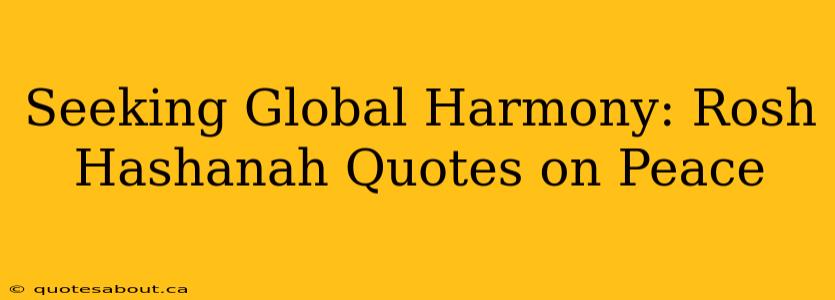Rosh Hashanah, the Jewish New Year, is a time of reflection, repentance, and hopeful anticipation for the year ahead. It's a period deeply rooted in prayer, introspection, and a yearning for a better future, not just for individuals but for the entire world. This yearning often manifests as a profound desire for peace—global peace—a theme woven throughout Jewish tradition and particularly resonant during this High Holy Day. This article explores the connection between Rosh Hashanah and the pursuit of global harmony, examining how traditional quotes and modern interpretations can inspire us to actively contribute to a more peaceful world.
What are some traditional Rosh Hashanah quotes about peace?
While there isn't a single, universally recognized Rosh Hashanah quote explicitly stating "global peace," the essence of peace permeates many traditional prayers and teachings. The core message revolves around teshuva (repentance), tzedakah (righteousness/charity), and chesed (loving-kindness). These pillars, when practiced individually and collectively, pave the way for a more harmonious world. The liturgy itself is filled with pleas for divine mercy and justice, implicitly suggesting a world where peace reigns. For example, the Unetanneh Tokef prayer, recited during Rosh Hashanah services, speaks of the judgment of the coming year, hinting that our actions – towards each other and the world – impact the outcome. The inherent message here is the responsibility we each bear in creating peace. One could interpret the many prayers for forgiveness and redemption as calls for global reconciliation and the establishment of a just and peaceful society.
How can Rosh Hashanah inspire us to work towards global peace?
Rosh Hashanah provides a powerful framework for promoting peace on a global scale. The introspection inherent in the holiday encourages us to examine our own behaviors and attitudes towards others, both within our immediate communities and across international boundaries. The emphasis on teshuva—repentance—reminds us to acknowledge our flaws, apologize for our wrongdoings, and strive to do better. On a broader scale, this principle calls for nations to acknowledge past wrongs, seek reconciliation, and commit to peaceful coexistence.
The concept of tzedakah extends beyond simple charity; it promotes social justice and equitable distribution of resources. Working towards global peace necessitates addressing systemic inequalities that fuel conflict, such as poverty, oppression, and discrimination. Practicing chesed, or loving-kindness, encourages empathy, compassion, and understanding – vital elements in bridging divides and building bridges of peace.
By embracing these core values, we can translate the spiritual essence of Rosh Hashanah into tangible actions that contribute to a more peaceful world. This might involve supporting organizations dedicated to conflict resolution, advocating for human rights, or engaging in interfaith dialogue.
How can we apply the themes of Rosh Hashanah to international relations?
The principles of Rosh Hashanah offer valuable insights for navigating the complexities of international relations. Teshuva can be applied to nations acknowledging their past mistakes and seeking reconciliation with other countries. Tzedakah on a global scale could mean fair trade practices, international aid efforts, and debt relief for developing nations. Chesed is crucial in fostering diplomatic relationships based on mutual respect and understanding.
What are some modern interpretations of Rosh Hashanah’s message of peace?
Modern interpretations of Rosh Hashanah emphasize the interconnectedness of humanity and the shared responsibility for creating a peaceful world. The holiday's message transcends religious boundaries, resonating with people of all faiths who seek harmony and justice. This interconnectedness is highlighted in modern social justice movements and initiatives that advocate for global peace and understanding. The focus is shifting from individual repentance to collective action aimed at addressing systemic issues that contribute to conflict.
Does Rosh Hashanah offer a specific action plan for achieving global peace?
Rosh Hashanah doesn't provide a specific, step-by-step action plan for achieving world peace. However, it instills a mindset and provides a moral compass for our actions. The holiday inspires us to actively engage in building a more just and peaceful world by promoting tolerance, empathy, and social justice through individual and collective efforts. It empowers us to become agents of change, promoting peace not just in our personal lives but on a larger global scale. The focus is less on a prescribed plan and more on cultivating the inner qualities – compassion, understanding, and a commitment to justice – necessary to contribute to lasting peace. The actions themselves will vary depending on individual circumstances and capabilities, but the guiding principles remain constant.
In conclusion, Rosh Hashanah, far from being solely a personal holiday of reflection, offers a powerful framework for striving towards global harmony. Its emphasis on repentance, righteousness, and loving-kindness provides a moral compass and inspires us to actively contribute to a more peaceful and just world. By embracing these principles, we can all play a part in realizing the profound aspiration of a world united in peace.

